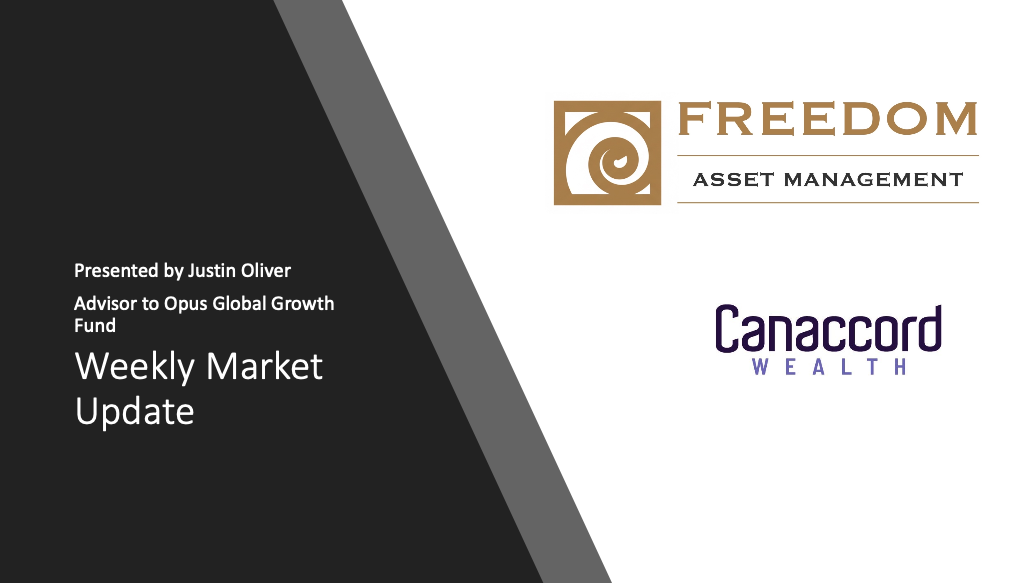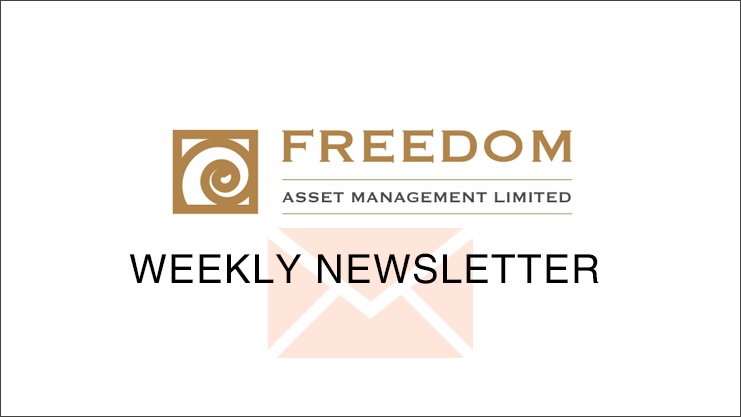Weekly Newsletter
Freedom Calls: 18/8/25, “Markets creep up in the summer calm and Trump miscalculates on Ukraine”
by
Freedom Asset Team
August 18, 2025
7 Minutes

Freedom Calls: 18/8/25, “Markets creep up in the summer calm and Trump miscalculates on Ukraine”
From the team at Freedom Asset Management
I always think Europe is a lucky continent (1) to have such lovely weather in the summer, and (2) the paid leave to be able to enjoy some of it. Last week was sailing around the beautiful, largely unspoilt Mediterranean jewel of Menorca - with family and close friends.

Pictured: Sunset, anchored in a quiet cove in Menorca, August 2025
Sailing sounds glamorous, but it is really a posh camping holiday. By that I mean: imagine being packed like sardines into a floating caravan with a couple of sails, where everything is a precious commodity - space, electricity, food, water, ice…. and the facilities are at best unreliable and periodically unusable, which brings with it a different kind of "range anxiety”….. to the nearest coastal shack with running water and obliging hostelry! But that is sailing, and it is great fun in good company, and teaches us every time how little resources we really need to have a great time…. who needs a shower every day anyway?!
Performance
Back in the real world, the markets have continued their upward creep in US dollars, which we are happy to see, with a particularly strong week for OGG. We are now entering typically the two quietest weeks of the trading year, so history tells us they should be benign before the news agenda gets set for September.
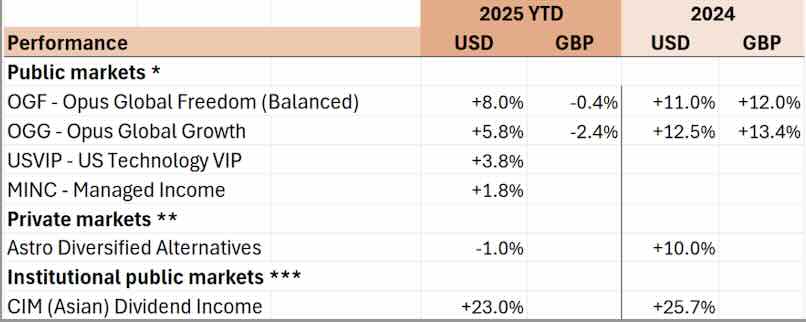
Source: * Estimates Freedom Asset Management as at 17/8/25. Please note depending upon how the funds are invested a small number of underlying funds can price 1-2 days after we take our estimates above so final published NAVs may vary. Estimated GBP returns are from a $1.25 FX rate on 31/12/24 and also launch date of USVIP 10/2/25, ** Note fund prices quarterly and includes 5% discount to NAV expressed as 5% performance above for 2024, *** FT Markets as at 17/8/25, I shares.
Trump miscalculates on Ukraine - will he now give up?
Much was made in the press about Trump’s failure in Alaska, and specifically his failure to secure a ceasefire. I don't see it as the same failure, but it was a miscalculation; we should always strive for peace, but that unfortunately does require the other party to want some version of peace as well. Putin has played his cards (and Steve Witkoff) and he is not interested in a ceasefire unless it comes with land. And if you have to give up land to get a ceasefire, you may as well go straight to the final peace deal.
Given that there is no easy land-free deal on Ukraine, I fear that Trump is now giving up. Trump's lack of interest in raising the game on sanctions just goes to show what a blunt and often self-defeating tool sanctions are. Putin has no qualms about depriving his population of goods and services - they have now learnt to live without so many of them. The collective West was the biggest seller of those high margin goods and services. China has no qualms about supplying Russia - and secondary sanctions on China and India is a foolish game if anyone thinks that gets us to a quick solution in Ukraine. If you take Russian crude off the market by telling India to stop exporting refined Russian product you are likely to get the kind of inflation that cost Biden his second term - and you don't want that, as traders start to price the upcoming winter supplies, noting we are only 15 months from the midterms in the US. And we don't need any more “chip wars”, or "rare earth wars” in that time either.
Ukraine should be worried, because if Trump is giving up, Europe is definitely not the answer to take on Russia. Maybe Trump’s calculation is that if land has to be given up, it is the Europeans that need to ink that deal - Trump does not want that on his record - after all, he has already signed the minerals deal that would come with winning in Ukraine. And his “win" from Alaska was Putin saying that had Trump been in power, there would have been no war. So Trump will view this as "Biden’s war” and may now wash his hands of it.
What Europe is really good at is holidays… what it is really bad at is long term decisions that matter
So given Europe’s inability to take any long-term decision, without undertaking a 5 year biodiversity study into the mating habits of bats, I now fear that resolution in Ukraine has been kicked down the road for some time. And that is sad for everyone, but especially sad for Ukraine. I will be happy to be proved wrong here.
And what does all this mean for markets (Trump’s major concern at home)? If there were a resolution we would see a celebratory bump up in markets and the analysis would be that sanctions relief would kick in soon. But "no deal" means no change for markets and no change to sanctions - and the markets that matter (the US) seem to be doing just fine right now without Ukraine's help or sanctions relief.
The Europeans will learn that Putin does not respond to “fairness” or sanctions, and so unless they are prepared to raise the battlefield game, (which they are not), this is going to involve some land.
This week’s articles:
- 10,000 days’ Cody Willard and Bryce Smith talk about “The Enterprise Software Dilemma” - and “Will AI kill “SaaS"?
- Canaccord’s Justin Oliver talks us through how the US is building its rare earth capability, in “the race for rare earths"
Please scroll down to read the articles.
For me the holidays are over and I am behind a desk in Guernsey this week, but wherever you are, please let me wish you a wonderful and peaceful week ahead,
Adrian
Co-Founder // Freedom Asset Management
Guernsey // Abu Dhabi // Hong Kong
M: +44 7781 40 1111* // M: +971 585 050 111 // M: +852 5205 5855* (*also WhatsApp)
---------------------------
“The Enterprise Software Dilemma” 18/8/25
By 10,000 Days’ Cody Willard and Bryce Smith, Advisers to the US Technology VIP Fund
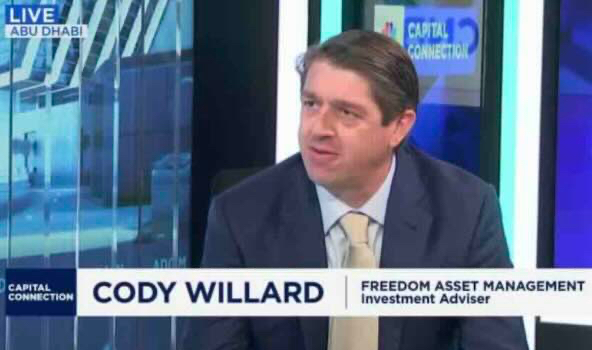
Software development is changing. AI can code, and it can code well. Despite the fact that AI has been around for some time now, the rate of improvement is accelerating and now AI services like Replit, Loveable, Firebase Studio, and Bolt.newcan build full-stack AI applications. They’re not perfect, but they’re close.
I don't know that the world fully grasps what this means for software development and the economy. And this really matters, especially in the United States, because we lead the world in software development, and software is probably our most important export (despite what President Trump might have you believe).
You see, the United States does this fantastic little trick where we import low-margin goods and export high-margin services. The biggest and most important chunk of services are technological services, like software. This is evident in the fact that the most valuable companies in the US (and the world for that matter), are technology companies. Now with AI, we can build software for a tenth of the cost and deploy it in a tenth of the time. That obviously has big implications for the software sector and the US economy at large.
That being said, I think the fears surrounding “legacy” enterprise software companies are more than priced in at this point. Salesforce (CRM), GitLab (GTLB), Adobe (ADBE), WorkDay (WDAY), and other large software companies are all sitting at 52-week lows because of the perceived AI threat.
There are going to be lots of new AI applications in the coming years, but I don't think most companies are going to build their own CRM or HR platform. Moreover, most companies probably don't want to build and manage thousands of their own custom apps. That sounds like an IT nightmare.
So, there could actually be a massive opportunity for Mega SaaS to quickly integrate AI features into their products and leverage their massive customers bases to upsell AI features and drive further growth. Are people forgetting that AI drops one of the primary costs (coding) for these established companies by 90-99% just like it has for the startups? Mega SaaS can build just as fast with agentic AI as a startup can. In our view, we expect companies like Salesforce will simply use AI to build semi-custom, domain-specific, AI-native versions of their software, which will enable them to penetrate more verticals and perhaps even add more small and medium sized businesses (SMBs).
Importantly, many of these SaaS systems, like Salesforce, are "systems of record," and there is really only downside to your business if you build this software yourself and mess it up. The cost savings you achieve by building your own CRM or HR platform do not outweigh the risk to your business if you build something that doesn't work.
To sum up the software landscape, we don't think we should underestimate the explosion of app development that is probably happening right now and will continue growing for the next few years with agentic AI. Moreover, if AI also makes traditional software much more useful to companies (as we expect it will), the whole IT budget could grow, and everyone wins. This is basically a scenario where tech becomes more productive than labour, so companies shift budget from HR to IT. There are shaping up to be some nice opportunities in enterprise software right here and we are hard at work identifying the best names to own (in addition to the ones already in the portfolio) to take advantage of this dislocation in the market.
Cody Willard and Bryce Smith
--------------------------------------
“The race for rare earths”, 18/8/25
By Canaccord’s Justin Oliver, Adviser to Opus Global Growth
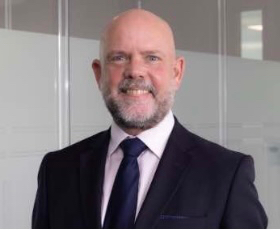
When President Trump and China’s President Xi Jinping finally sit down to hash out a trade deal, China’s access to the most sophisticated US semiconductors and United States' access to China’s rare earth minerals will be two of the largest negotiating chips on the table.
To gain the upper hand, China is racing to develop its own high-end semiconductors, and the US is spending billions on the development of domestic production of rare earth minerals.
China has half of the world’s rare earth minerals reserves and most of its refining capacity. In its most significant move toward rare earth independence, last month the US Department of Defense (DoD) took a 15% equity stake in MP Materials, a US rare earth miner. Long-term purchase agreements guarantee that the DoD will pay the company a minimum price for rare earth minerals and magnets. News of the multi-billion-dollar deal sent the company’s shares soaring. At the time of writing, they are up over 380% for the year to date.
In terms of other efforts to boost domestic supplies of rare earths:
- Critical Metals received in June a $120 million loan from the US Export-Import Bank to fund the development of a rare earth mine in southern Greenland, which has one of the largest untapped deposits of heavy rare earths outside of China. The mine is expected to produce 85,000 tonnes of rare earth concentrates in 2026 and subsequently scale up to produce 425,000 tonnes. The company hopes to receive additional funding from the US government to help it build a rare earth processing plant in the US, a June 15 article in Mining.com reported Lynas USA, a division of an Australian company, aims to build a heavy rare earths processing facility in Texas. The company received $258 million of funding from the DoD in 2023. But the project has yet to break ground, having run into unexpected expenses and permitting issues related to the plant’s wastewater. So, the company has asked the US government to bear some of the additional financial costs, an April 28 WSJ article reported ironically, that any material produced at the plant would have to be shipped to Vietnam, where Lynas’s parent has plants that turn the material into a magnet.
- The DoD is also funding efforts to recycle rare earth metals and magnets. It has awarded REEcycle $5.1 million to recover rare earths from electronic waste and Ucore Rare Metals $22 million to build a rare earth recycling machine and facility in Louisiana. Alta Resource Technologies has raised almost $10 million from private investors to develop and commercialize its biochemical separation of rare earth metals from low-grade ores and waste streams. Alta's technology was developed in partnership with the Lawrence Livermore National Laboratory and Pennsylvania State University. The DoD-funded Critical Materials Innovation Hub, Western Digital, and PedalPoint recycling have developed an acid-free dissolution recycling technology to separate out rare earths. Microsoft tested the process, which was able to separate rare earths, gold and copper from shredded hard disk drives, mounting caddies, and other materials, a May 9 articlein Mining Technology reported.
There are also those who are trying to kick the US dependency on rare earths altogether. Funded by the Department of Energy, Ames National Laboratory is working to identify rare-earth-free metals. In April, it announced the development of a magnet that used manganese and bismuth and could retain its magnetism at high temperatures. Likewise, Niron Magnetics has produced an iron nitride magnet that performs at high temperatures.
Justin Oliver
--------------------------------
If you would like to be removed from this Monday morning mail, please reply ‘unsubscribe’.
Capital at risk. For further details about any of Freedom’s investment strategies or a copy of any fund prospectus, please contact investor@freedomasset.com. Please note: The value and the income produced by strategies may fluctuate, so that an investor may get back less than initially invested. Value and income may be adversely affected by exchange rates, interest rates, or other factors. Levels and bases of taxation may change. Investors should consult their own tax advisor regarding their individual tax treatment with respect to the strategies referred to herein. This document does not represent a research report. The opinions expressed are those of the authors only, and may not be representative of, or shared by, Freedom Asset Management Limited or its affiliates. This email should not be considered to be an offering memorandum and is not an offer to sell nor a solicitation of an offer to purchase interests in any fund. Offers and sales will be made only pursuant for the current prospectus, constituent documentation and in accordance with applicable securities laws. A decision to invest in any of the funds should only be based upon review of such documents and these materials are qualified in their entirety by reference thereto.
Please note Freedom’s investment strategies are only available to Professional Investors, as determined by the relevant jurisdiction.
This message is intended solely for the addressee and may contain confidential or privileged information. If you have received this message in error, please permanently delete it and do not use, copy or disclose it. Freedom Asset Management Limited is licensed to carry on controlled investment business under the Guernsey Financial Services Commission (GFSC); Reference Number 2262946. The registered office of Freedom Asset Management Limited is: 2nd Floor, New Century House, 2 Jubilee Terrace, St Peter Port, Guernsey, GY1 1AH, Channel Islands. Freedom Asset Management (Middle East) Limited is authorised and regulated by Abu Dhabi Global Market (ADGM) Financial Services Regulatory Authority, No: 250016. The registered office address of Freedom Asset Management (Middle East) Limited is Office 2406, Tamouh Tower, Al Reem Island, Abu Dhabi Global Markets, Abu Dhabi, United Arab Emirates. Freedom Asset Management (Asia) Limited, holds a Type 9 Asset Management license from the Securities and Futures Commission in Hong Kong, Ref: BUR351. The registered office of Freedom Asset Management (Asia) Limited is Rm 97 5/Fl United Centre, 95 Queensway, Admiralty, Hong Kong.
© 2025 Freedom Asset Management Limited.

